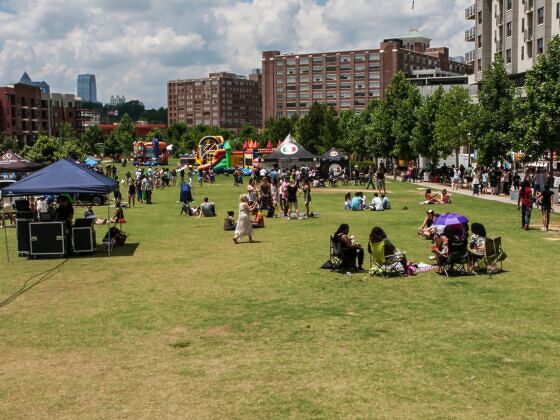If there was ever a pageant for the gentrification of Atlanta, O4W would be flashing its bleached Imako teeth and blubbering all over its new glitzy tiara. What once was a neighborhood active in political and human-rights history now spawns vibrant-colored fruit shops, rectangular modern homes, condominium complexes, and a herd of juicers washed in by the BeltLine, licking hollandaise sauce from their fingertips at brunch.

Joggers with yellow labradors wipe sweat off their brows and lick cereal milk popsicles in the parking lot of Irwin Street Market. Thick bearded cliques roll American Spirit tobacco before disappearing into Highland Ave’s smoky hole in the wall to wash down gargantuan slices of mashed potato and fried chicken smothered pizza with $4 pitchers of Miller High Life. Fathers with half sleeves lift their 4-year olds to spray finishing touches on a fresh tag in the Krog Street Tunnel. Ponytailed women dap juice from honey-drizzled and umbrella-pierced cups of mango from their chins with lime green and hot pink napkins. Hammered techies draped in choir robes wail Jolene next to sacrilegious wall art at Church for Wednesday night’s organ karaoke. Blank buildings evolve to living wall murals of koi fish and intricate kaleidoscope designs. And with each honk from traffic-clogged streets and pissed-off commuters, the cost of housing raises another dollar.
And while I washed down my own share of Soul Food pizza with $4 pitchers of High Life and wiped sweat off my brow while licking cereal milk popsicles, what I miss about O4W isn’t the brightly colored buildings and cute coffee shops. What I miss are the faces of those who didn’t flock to the area for the promise of scattered art along the BeltLine, streetcars, or a Sears warehouse turned massive Ponce City Market. I miss those who remember the once unpaved streets and cracked sidewalks of a neighborhood drenched in history long before one could tour the birthplace of Martin Luther King Jr. to kill time before lunch.
I miss Phil, the greying homeless man in his 50s who lived in a carpeted blue tent up the street. He’d tap on my front door about three times a week with a wide smile.
“Hi, hon. I need a project for some kerosene.”
And after pulling weeds from the front yard or painting a pot for my cactus, we’d sit on the porch and share glasses of syrupy sweet iced tea and packs of Camel Crush. He’d tell me stories of how he used to sleep on Jackson Street Bridge to watch the sun sink behind the Atlanta skyline. Or how he’d found a ripe tomato in the trash as an 11-year-old and thought it was a sign from God to be a farmer. And between plates of buttered toast and grits, we’d quietly mock the hungover hipsters stumbling towards the warm scent of fruit-stuffed Hungarian crepes wafting from Julianna’s around the block.
I miss my 74-year-old neighbor, who had lived her whole life in the same yellow home now scrunched between two gray modern houses. She’d sit on her front porch reading Agatha Christie and Elizabeth George while Aretha Franklin seeped through her cracked windows. Every week or so, she’d bang on my door with her balled up fist, holding a styrofoam plate of macaroni and cheese, fried okra, green beans, and cornbread.
“Fridge’s full,” she’d croak, the butt of a Newport hanging from the edge of her lips.
I miss Rosemary, the 80-year-old who would frequent the Sweet Auburn Curb Market. Her shoulders hunched and the cracks around her eyes tightened with gapped tooth smiles as she’d delicately nibble on a buttery brown sugar coated pecan from Miss D’s Pralines.
“I’d get one of her candy apples, but I’d break the last of my teeth,” she’d wink.
She’d flip through musty pages of Sisters Bookshop, laughing at various words like ‘buzz’ and ‘cattywampus,’ stopping every so often to take in the smells of cajun chicken gumbo pie from Panbury’s and remind me that mustard greens are the only greens worth having.
Then there were the faces who passed without a name or a word. The faces who would make brief eye contact before passing through the O4W they had known before pizza was a creative outlet and coffee was an artistic craft. The faces who reminded us that, as neighborhoods conform and juicers lick hollandaise sauce from their fingertips, there are those watching their past fade behind yet another backdrop of retail stores and vibrantly colored fruit shops. The faces of a neighborhood still loved but long forgotten.